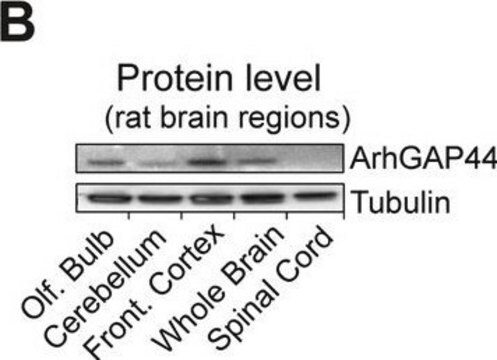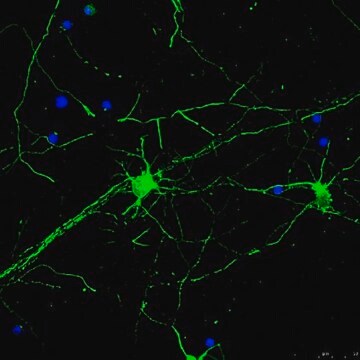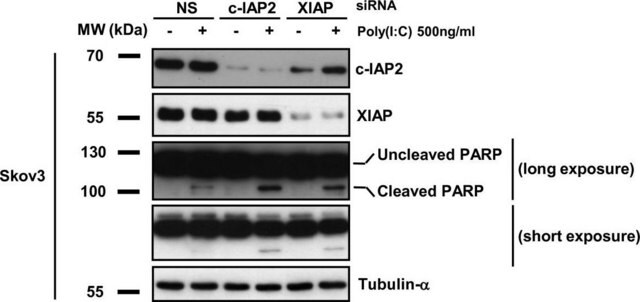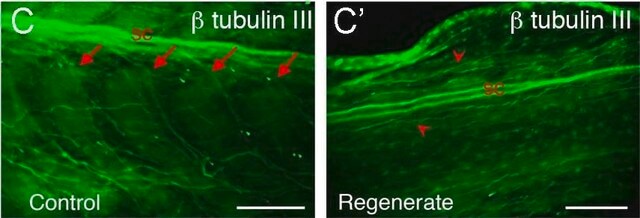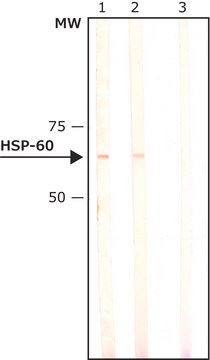MAB380
Anti-Tubulin β Antibody, clone 5H1
ascites fluid, clone 5H1, Chemicon®
Sign Into View Organizational & Contract Pricing
All Photos(1)
About This Item
UNSPSC Code:
12352203
eCl@ss:
32160702
NACRES:
NA.41
Recommended Products
biological source
mouse
Quality Level
antibody form
ascites fluid
antibody product type
primary antibodies
clone
5H1, monoclonal
species reactivity
rat, human, bovine
manufacturer/tradename
Chemicon®
technique(s)
immunohistochemistry: suitable
isotype
IgM
NCBI accession no.
UniProt accession no.
shipped in
dry ice
target post-translational modification
unmodified
Gene Information
human ... TTLL8(164714)
Specificity
Beta tubulin
Immunogen
Rat tubulin.
Application
Anti-Tubulin Antibody, β, clone 5H1 is an antibody against Tubulin for use in IH.
Immunohistochemistry at 1:300-1:1,000
Optimal working dilutions must be determined by end user.
IMMUNOHISTOCHEMISTRY PROTOCOL FOR MAB380
This antibody has been used successfully on 30 μm, free floating, 4% paraformaldehyde fixed rat brain tissue. All steps are performed under constant agitation. Suggested protocol follows.
1) 3 x 10 minute washes in TBS (with or without 0.25% Triton).
2) Incubate for 30 minutes in TBS with 3% serum (same as host from secondary antibody).
3) Incubate primary antibody diluted appropriately in TBS with 1% serum (same as host from secondary antibody) (with or without 0.25% Triton) for 2 hours at room temperature followed by 16 hours at 4°C.
4) 3 x 10 minute washes in TBS.
5) Incubate with secondary antibody diluted appropriately in TBS with1% serum (same as host from secondary antibody).
6) 3 x 10 minute washes in TBS.
7) ABC Elite (1:200 Vector Labs) in TBS.
8) 2 x 10 minute washes in TBS.
9) 1 x 10 minute wash in phosphate buffer (no saline).
10) DAB reaction with 0.06% NiCl added for intensification.
11) 2 x 10 minute washes in PBS.
12) 1 x 10 minute wash in phosphate buffer (no saline).
Optimal working dilutions must be determined by end user.
IMMUNOHISTOCHEMISTRY PROTOCOL FOR MAB380
This antibody has been used successfully on 30 μm, free floating, 4% paraformaldehyde fixed rat brain tissue. All steps are performed under constant agitation. Suggested protocol follows.
1) 3 x 10 minute washes in TBS (with or without 0.25% Triton).
2) Incubate for 30 minutes in TBS with 3% serum (same as host from secondary antibody).
3) Incubate primary antibody diluted appropriately in TBS with 1% serum (same as host from secondary antibody) (with or without 0.25% Triton) for 2 hours at room temperature followed by 16 hours at 4°C.
4) 3 x 10 minute washes in TBS.
5) Incubate with secondary antibody diluted appropriately in TBS with1% serum (same as host from secondary antibody).
6) 3 x 10 minute washes in TBS.
7) ABC Elite (1:200 Vector Labs) in TBS.
8) 2 x 10 minute washes in TBS.
9) 1 x 10 minute wash in phosphate buffer (no saline).
10) DAB reaction with 0.06% NiCl added for intensification.
11) 2 x 10 minute washes in PBS.
12) 1 x 10 minute wash in phosphate buffer (no saline).
Research Category
Cell Structure
Cell Structure
Research Sub Category
Cytoskeleton
Cytoskeleton
Physical form
Ascites fluid containing sodium azide. Liquid
Storage and Stability
Maintain at -20°C in undiluted aliquots for up to twelve months. Avoid repeated freeze/thaw cycles.
Legal Information
CHEMICON is a registered trademark of Merck KGaA, Darmstadt, Germany
Disclaimer
Unless otherwise stated in our catalog or other company documentation accompanying the product(s), our products are intended for research use only and are not to be used for any other purpose, which includes but is not limited to, unauthorized commercial uses, in vitro diagnostic uses, ex vivo or in vivo therapeutic uses or any type of consumption or application to humans or animals.
Not finding the right product?
Try our Product Selector Tool.
Storage Class Code
12 - Non Combustible Liquids
WGK
nwg
Flash Point(F)
Not applicable
Flash Point(C)
Not applicable
Certificates of Analysis (COA)
Search for Certificates of Analysis (COA) by entering the products Lot/Batch Number. Lot and Batch Numbers can be found on a product’s label following the words ‘Lot’ or ‘Batch’.
Already Own This Product?
Find documentation for the products that you have recently purchased in the Document Library.
Human family with sequence similarity 60 member A (FAM60A) protein: a new subunit of the Sin3 deacetylase complex.
Smith, KT; Sardiu, ME; Martin-Brown, SA; Seidel, C; Mushegian, A; Egidy, R; Florens et al.
Molecular and Cellular Proteomics null
Alexandre Fifre et al.
The Journal of biological chemistry, 281(1), 229-240 (2005-10-20)
A growing body of evidence supports the notion that soluble oligomeric forms of the amyloid beta-peptide (Abeta) may be the proximate effectors of neuronal injuries and death in the early stages of Alzheimer disease. However, the molecular mechanisms associated with
Central nervous system delivery of the antipsychotic olanzapine induces hepatic insulin resistance.
Martins, PJ; Haas, M; Obici, S
Diabetes null
Activation of platelet-activating factor receptor and pleiotropic effects on tyrosine phospho-EGFR/Src/FAK/paxillin in ovarian cancer.
Margarita Aponte, Wei Jiang, Montaha Lakkis, Ming-Jiang Li, Dale Edwards, Lina Albitar et al.
Cancer Research null
Kyle S McCommis et al.
Molecular metabolism, 5(8), 602-614 (2016-09-23)
Transport of pyruvate into the mitochondrial matrix by the Mitochondrial Pyruvate Carrier (MPC) is an important and rate-limiting step in its metabolism. In pancreatic β-cells, mitochondrial pyruvate metabolism is thought to be important for glucose sensing and glucose-stimulated insulin secretion.
Our team of scientists has experience in all areas of research including Life Science, Material Science, Chemical Synthesis, Chromatography, Analytical and many others.
Contact Technical Service